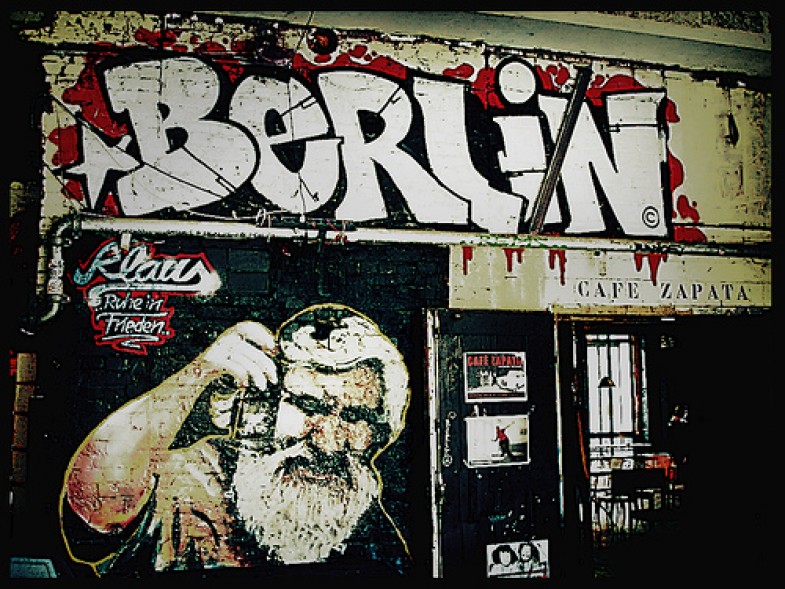Bring a group of commons advocates together, and the conversation will soon hit on the topic of what is and what is not a commons. Everyone agrees that some things are not commons, but there’s no general consensus on what exactly is.
But one thing I know for sure: When you are in Berlin, potatoes are definitely part of the commons—a big part.
Let me explain. A delegation from On the Commons is in the German capital attending The International Commons Conference hosted by the Commons Strategy Group (which includes our colleague David Bollier) at the Heinrich Boell Foundation, just a short stroll from where the infamous wall once stood. Commoners from 34 countries are here, and the presentations from the podium and the conversations in between sessions are keenly stimulating, with a strong focus on how the movement’s principles translate into practical policies. We are learning about all that’s happening from Ecuador to India to South Africa to Brazil.
And, yes, the potatoes served at supper were excellent—lightly roasted with sprinkling of herbs.
And they were excellent yesterday at the Potato Café in the bohemian/immigrant Kreuzberg quarter of the city, where we made a field trip to learn about a commons-based project where a group of young farmers distributes potatoes free of charge to the city’s low-income households. They cultivate acres of spuds on land outside the city provided by a foundation.
The potatoes at the cafe, representing four favorite local varieties, were boiled and served with a rich sour cream sauce.
And in tonight’s keynote addresses, which attracted a SRO crowd of Berliners along with conference goers, leading German commons advocate Silke Helfrich declared “the commons are so diverse they bring together computers and potatoes.”
I think the potato makes a great icon for the promise of the commons movement. It’s a humble yet wholesome and tasty food, steeped in local traditions from the Andes to Ireland to Idaho, which reminds us that the commons sustains our everyday lives.
Similar themes were voiced all day the conference. A quick recounting just a few of the highlights includes:
• Impassioned talks by a cabinet minister and a member of the National Assembly of Ecuador, both of whom described how a new constitutional measure recognizing the rights of nature led to innovative environmental initiatives. Maria Fernanda Espinosa Gracés, Minister for National Heritage, noted that the words “developed” and “underdeveloped” no longer make sense when talking about the relative wealth of various nations. Instead of development, the goal of any nation should be “good living,” which has more to do with the commons than with Gross Domestic Product.
• Claiming power rather than critiquing what’s wrong with present-day society was a big theme expressed in both speaker’s comments and responses from the floor. David Bollier set the tone in his opening remarks. “We’re not looking for a Big Daddy to solve our problems. We’re stepping up to solve problems ourselves.”
• Michel Bauwens of the Thailand-based Peer2Peer Foundation stirred the pot further in bringing up the notion of “Class struggle 3.0, which involves not just workers standing up for their rights, but communities.”
• Alberto Acosta, a former President of Ecuador’s Constituent Assembly, advocated that we must begin “a massive process of decommercialization,” invoking the actions of a certain dissident 2000 years ago who drove the moneychangers from a temple, an act of reclaiming the commons chronicled in the Christian New Testament.
• And a wide-ranging conversation at breakfast with the OTC delegation, and Neal Gorenflo, publisher of Shareable.net, an online magazine, brought some new insight to the continuing conversation about what is and what’s not a commons. It’s not a binary systems where something is a complete commons or not at all, we agreed. While the air is a commons in almost everyone’s point of view, and few would argue that we share our toothbrushes and dirty underwear, a lot of what we share and how we share it falls somewhere in between. The main point is not to waste too much time about how pure this or that commons is. Focus instead on how important it is to our lives. Think of a coffee shop, which generally hews to the private property side of the commons/not commons spectrum, but nonetheless can become a very important gathering spot shared by a community.
And that important insight, I must admit, occurred with no potatoes on our plates.







